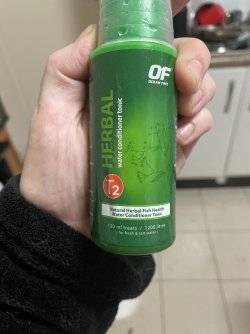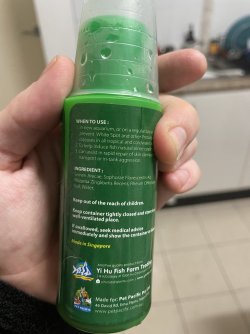Nope, there is no evidence that garlic works as a med especially as an anitbiotic.
OOPS!
(If folks would like to see more papers on this, there are lots more available.)
Valenzuela-Gutiérrez, R., Lago-Lestón, A., Vargas-Albores, F.
et al. Exploring the garlic (
Allium sativum) properties for fish aquaculture.
Fish Physiol Biochem 47, 1179–1198 (2021).
https://doi.org/10.1007/s10695-021-00952-7
Abstract
The aquaculture industry’s rapid growth to meet commercial demand can trigger an outbreak of infectious diseases due to high-density farming. Antibiotic overuse and misuse in fish farming and its global health consequences have led to searching for more natural alternatives such as medicinal plants. In this sense, garlic (
Allium sativum) has different bioactive compounds with biological properties for animal health. Among them are the ajoene, alliin, and allicin, which confer biological properties such as growth promotion, antimicrobial, antiviral, antioxidant, and antiparasitic. Ways to use garlic in aquaculture include oil, fresh mash, aqueous extract, and garlic powder. The powder presentation is the most used in aquaculture; it is generally applied by oral administration, adding to the feed, and the dose used ranges from 0.05 to 40 g/kg of feed. Garlic has been used in the aquaculture of different species such as rainbow trout (
Oncorhynchus mykiss), spotted grouper (
Epinephelus coioides), catfish (
Clarias gariepinus), tilapia (
Oreochromis niloticus), guppy fish (
Poecilia reticulata), goldfish (
Carassius auratus), and barramundi (
Lates calcarifer). In addition to its properties, garlic’s usage became popular, thanks to its low cost, easy incorporation into food, and little environmental impact. Therefore, its application can be an effective solution to combat diseases, improve organisms’ health using natural supplies, and as an alternative to antibiotics. This review reports and discusses plant-derived products’ beneficial properties, emphasizing garlic and its usages in fish aquaculture.
Motlagh, H.A., Safari, O., Selahvarzi, Y., Baghalian, A. and Kia, E., 2020. Non-specific immunity promotion in response to garlic extract supplemented diets in female Guppy (Poecilia reticulata).
Fish & shellfish immunology,
97, pp.96-99.
Highlights
- • Garlic extract enhanced skin mucus immune parameters in Guppy.
- •Growth parameters were slightly but not significantly increased in garlic-treated Guppies.
- •Administration of 0.15 mL of garlic extract per kg feed is suggested to obtain optimal skin mucus immunity in P. reticulata.
Abstract
In the present study, the effect of aqueous garlic (
Allium sativum) extract on skin mucus immune parameters of
Poecilia reticulata was evaluated. A total of 240
P. reticulate juveniles, weighing 0.013 ± 0.001 g, were randomly stocked in 12 experimental glass tanks at a density of 30 fish per tank. The fish were fed with diets supplemented with garlic extract at the concentrations of 0, 0.10, 0.15, and 0.20 ml kg−1 of diet three times a day at a ratio of 2.5% of their
body weight for 80 days. Results of the study showed that,
lysozyme activity increased significantly in the skin mucus of garlic-treated Guppy (P < 0.05). Values of ACH50 significantly increased (P < 0.05) in fish by increasing concentration of garlic extract from 0 to 0.15 ml kg−1 in diet. ACH50 also showed a significant declining trend (P < 0.05) by increasing concentration of garlic extract from 0.15 to 0.20 ml kg−1. Total
Ig content was enhanced significantly in 0.15 and 0.20 ml kg−1 treatments as well.
ALP activity significantly increased in garlic-fed treatments compared to the control. Inclusion of garlic extract in diet was found to have no significant effect on final
body weight and
weight gain. Results revealed that, administration of 0.15 mL of garlic extract per kg feed is suggested to obtain optimal skin mucus immunity in
P. reticulata.
|
| Motlagh, H.A. and Pourmozaffar, S., 2021. Effect of garlic extract supplementation on growth performance, nonspecific immunity, and antibacterial activity of skin mucus in goldfish, Carassius auratus. International Journal of Aquatic Biology, 9(6), pp.350-359. |
|
|---|
Abstract
In the present study, the effects of dietary supplementation of garlic extract on growth performance, skin mucus immunological parameters and antibacterial activity of
Carassius auratus were examined. Fish were stocked in 100 L glass tanks (6 fish per tank) in triplicate and fed diets containing different garlic extracts (0 (control), 5, 10, and 15 ml/kg] for eight weeks. At the end of feeding period, the fish skin mucus was collected for evaluating the components of non-specific immune system (including lysozyme, complement, total immunoglobulin, dissolved protein, and alkaline phosphatase). Additionally, antimicrobial activity of the skin mucus against
Aeromonas hydrophila,
Yersinia ruckeri,
Micrococcus luteus,
Streptococcus faecium, and
S. iniae was assessed. After the feeding trial, the fish fed diets containing garlic extract showed no significant difference in growth parameters. Significantly higher skin mucus lysozyme, complement, alkaline phosphatase activities, and total immunoglobulin and dissolved protein concentration were observed in the fish fed garlic extract-supplemented diets (
P<0.0001). The antimicrobial activity of the skin mucus increased along with the increase in the dietary garlic extract levels (
P<0.0001). Moreover, garlic extract exhibited the antimicrobial activity against pathogenic bacterial species. The highest level of dietary garlic extract (15 ml/kg) led to significantly higher inhibition zones against pathogenic bacterial species compared to the other garlic extract levels (
P<0.0001). The optimal administration of garlic extract at 15 ml/kg enhance skin mucus immune parameters and antimicrobial activity in goldfish.



